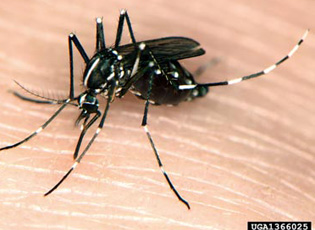by Kelly Middleton
San Gabriel Valley Mosquito & Vector Control District
After identifying Asian tiger mosquitoes (Aedes albopictus) in the cities of El Monte and South El Monte this month, the Greater Los Angeles County Vector Control District and the San Gabriel Valley Mosquito & Vector Control District are collaborating in a campaign to conduct neighborhood surveillance, control, and outreach to raise awareness and determine the extent of the Asian tiger mosquito infestation in Los Angeles County. Previous door-to-door campaigns conducted separately by these public health agencies yielded numerous sites where mosquitoes were breeding and adult mosquitoes were present throughout the surveyed area.
Image: US Department of Agriculture
 “If the Asian tiger mosquito becomes established here in LA County, it would be a game changer for all of us. Residents would need to be concerned about disease-transmitting mosquitoes biting them during the day,” said Truc Dever, GLACVCD Director of Community Affairs. “We need the public’s help in order to control and eradicate this dangerous pest. We are asking everyone to call us if they are getting bitten by mosquitoes during the day.”
“If the Asian tiger mosquito becomes established here in LA County, it would be a game changer for all of us. Residents would need to be concerned about disease-transmitting mosquitoes biting them during the day,” said Truc Dever, GLACVCD Director of Community Affairs. “We need the public’s help in order to control and eradicate this dangerous pest. We are asking everyone to call us if they are getting bitten by mosquitoes during the day.”
Asian tiger mosquitoes (Aedes albopictus) are native to Southeast Asia and were first found in the United States in 1985. Since then, the species has spread throughout the southeast and eastern U.S.
Unlike most mosquitoes native to California, the Asian tiger mosquitoes are aggressive day-time biters and efficiently carry and transmit dengue, yellow fever, chikungunya, and West Nile viruses, dog heartworm, and several other viruses that can cause encephalitis. Asian tiger mosquitoes are responsible for recent outbreaks of dengue virus in south Florida, Texas, and Hawai’i. They are approximately ¼ inch long and have distinctive black and white bands across their body and legs. These mosquitoes are considered “container breeders” and require very little water to lay eggs and breed. Females will lay individual eggs next to the water surface in buckets, flower pots, and even trash. They will also lay eggs in natural containers such as tree holes, bamboo, and inside flowering plants such as bromeliads. The eggs can remain viable for years in the right environment and hatch once the eggs are re-flooded with water.
In order to stop the spread of this species in Los Angeles County, public health officials are calling upon all residents in nearby communities to do their part. Because many of the mosquito breeding sites are on patios and in backyards, residents are urged to participate by following these steps:
- CALL AND REPORT if you see any small, black and white mosquitoes or if you are being bitten by mosquitoes during the day!
- Search for and discard any containers, cans, buckets, or old tires around the home.
- Remove any water dishes from beneath potted plants and drill drain holes in all decorative flower pots.
- Dump and drain any standing water around the home and wipe the containers thoroughly with a towel to remove any eggs.
- Do not store water in uncovered buckets or rain barrels. Ensure rain barrels are completely sealed to prevent mosquitoes from entering.
- Empty bird baths and small fountains completely or clean them thoroughly every 3 days.
- Clean out rain gutters and lawn drains to ensure water does not collect.
- Water plants at the bottom near the soil, not the top.
- These mosquitoes prefer wet, hot, shady and humid areas with lots of plants, shrubs, and tree foliage. Regularly check gardens for potential breeding sites.
- Talk to your neighbors about preventing mosquitoes from breeding.
For more information about the Asian tiger mosquito, to submit a service request, or to report possible sightings, please contact the Greater Los Angeles County Vector Control District at (562)944-9656 (www.glacvcd.org) or the San Gabriel Valley Mosquito & Vector Control District at (626)814-9466 (www.SGVmosquito.org). For media opportunities, please contact GLACVCD PIO Crystal Brown at cbrown@glacvcd.org or call 562-325-3271.



